Hello readers,
This week’s post is brought to you by guest writer, Terry who you may remember earlier in the year from her review on Are You There God? It’s Me Margaret.
Her chosen film is from a couple of years ago and can be found on Amazon Prime. I have not seen the film myself but after her review and passionate breakdown, I have added it to my list and a modern fairy tale is always a great watch this time of year.
Cinderella (2021)
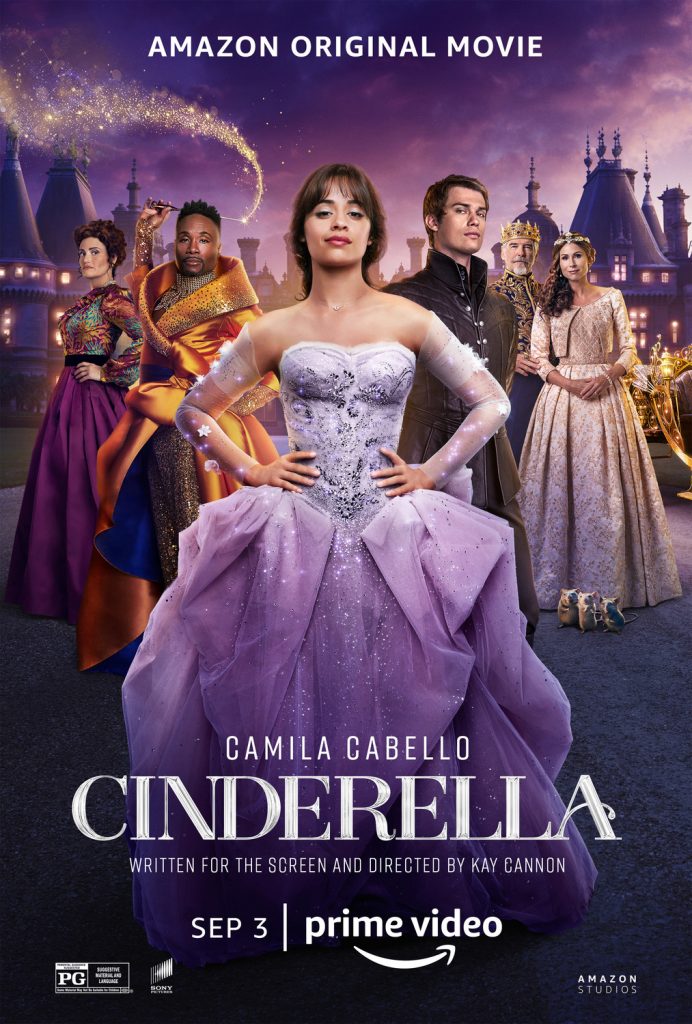
If the star-studded poster above doesn’t narrow down which version of the legendary chronicle this review will focus on, it is the jukebox musical rom-com adaption written and directed by the one and only Kay Cannon (of Pitch Perfect, New Girl, Girlboss etc. fame!). Before we begin…
Truthfully, it took me time to finally give this Cinderella a chance. Unfortunately, I was put off watching after hearing various negative opinions. However, as many people (including good friend/film fanatic Robyn) rightly say, ‘you have to watch and see for yourself’. Now that I have, my only regret is… Not watching sooner! Everyone’s entitled to their own opinion of course, but I feel most of the negative remarks I heard came from people who weren’t the target audience i.e., non-musical lovers, or those who believe there’s been enough revamped fairy-tale adaptations. While there’s something to be said about the latter, it’s hard to argue against wanting to recapture the magic of certain stories. Especially if they have something new to say.
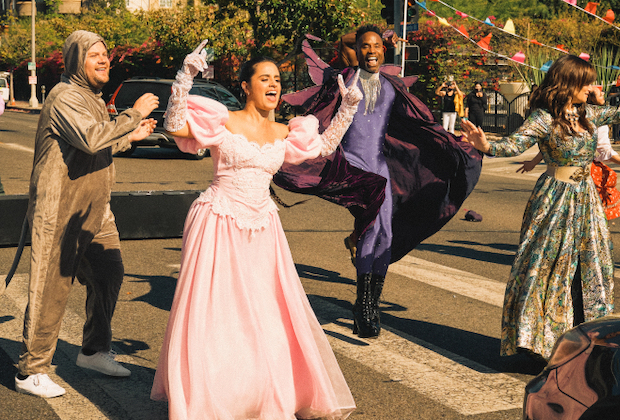
Thanks to social media I had actually seen a lot of Cinderella’s promotional material, by the time I eventually watched, I thought I’d already seen the film’s most imperative parts. Something I found especially frustrating as I hate when previews incorporate spoilers, something that too many do now as a form of enticement. To that end I assumed I knew what to expect, especially since I’m familiar with the fairy-tale. How wrong I was! This version of Cinderella is still an orphan with mice friends in the unenviable position of being forced to be a maid by a stepfamily who treat her with contempt (when they aren’t ignoring her). Nevertheless, despite being another retelling of an already quite frequently adapted, centuries old fable – and having the daunting task of trying to stand apart from extensively popular Disney versions – Cannon’s Cinderella managed to surprise me being unapologetically unique in a myriad of enjoyable ways. Some of which included having genuine laugh-out-loud comedic moments (especially when the mice take on their human/celebrity personas), as well as clever pokes at traditional fairy-tale tropes. Such as, despite being set in a conventional medieval-esque fairy-tale kingdom, the film has modern elements. This is evident in several ways. The soundtrack is an obvious example, additionally the dialogue is ‘with-the-times’. On this note, many of the characters have American accents. Save for the Royal family, other members of nobility and most of their closest allies/companions, who are of course English, Scottish or from another UK region. Although it’s worth noting that, for the most part, it seems that the majority of the characters speak their portrayers’ real accent. There is so much else to say about the film it is easier to split my thoughts into categories.
Soundtrack
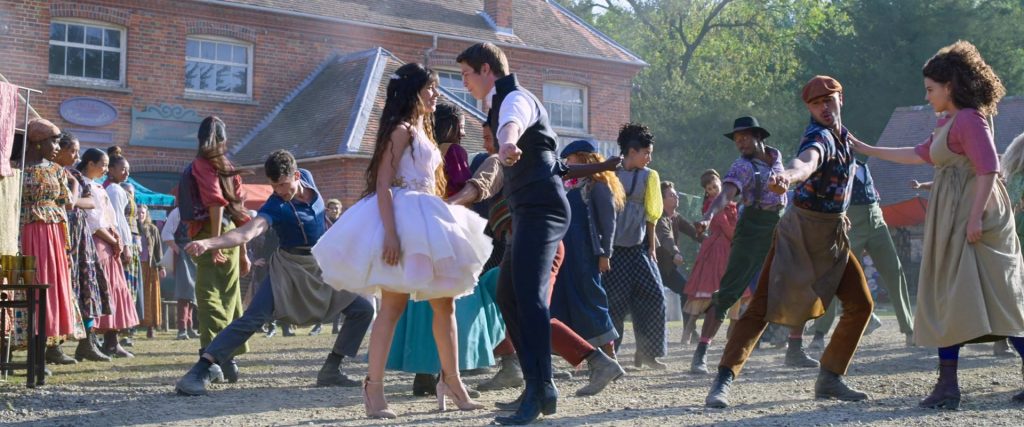
Cinderella’s jukebox status is deserved given its impressive roster featuring an extensive compilation of songs. With iconic covers such as, but not limited to: Madonna’s ‘Material Girl’, Queen’s ‘Somebody to Love’, Ed Sheeran’s ‘Perfect’, including fun mashups, and even one or two original pieces. Whether they’re accompanied by fun choreographed dances or not, all result in memorably entertaining and/or moving performances.
If I wanted to convince a non-musical aficionado who finds singing about feelings ‘cheesy and unrealistic’ to give Cinderella, and other musicals, a chance I’d say two things (and if they’re cynical enough not to take a chance on my recommendation, their loss). One: as far as realism goes, escapism is far more fun. Two: much like dramatic plays or films employ intense monologues; musicals instead use songs as a medium to communicate innermost thoughts and emotions of their characters, and they shouldn’t be snubbed. Music is a powerful tool for expression. Cinderella has a lot to say, and each song was very carefully chosen, taking into account which character(s) would perform it and why. You’ll be listening to the album of this iconic masterpiece on a loop after your very first watch, I know I still am!
Themes
Having the courage to never abandon your dreams and goals no matter the obstacles in your path is definitely one of Cinderella’s main messages. Wanting more for yourself no matter your circumstances doesn’t make you selfish, everyone is entitled to happiness and fulfilment. Speaking your mind and standing up for yourself and what you believe in is another point Cannon wants to drive home, evident in the way most of the characters refuse to stand down. Another message, without revealing spoilers, is that love is worth fighting for and you don’t ultimately have to make a choice between your achieving dreams or getting to be with your one true love (e.g. Mia and Seb in La La Land). You can enjoy both and more.
Correspondingly, feminism is an important theme. From the moment we hear from Billy Porter’s narration as fairy godparent (or ‘Fab G’) in the opening, we’re made to understand the kingdom is old-fashioned and traditional. In other words, patriarchy is rampant. Men are leaders and breadwinners; women expected to be compliant mothers, wives, and daughters. No room for interests outside the house, definitely not careers. Furthermore, they’re scrutinised and mocked for wanting more. This is especially investigated with Ella’s journey through the film as she challenges sexism and gender conventions.
In my opinion something that works in Cinderella’s favour is it’s deliberation in how patriarchy harms men as well as women. While women are oppressed and belittled, men are taught to uphold toxic masculinity and reject weakness no matter personal feelings or toll. Exploring how patriarchy negatively affects them too is refreshing, especially since it seems more films are taking note i.e., Barbie. Additionally, while feminism is the credence that men and women are and should be equals, it’s often grossly and damagingly misunderstood. Firstly, that being a feminist means hating men. Secondly, that it is about female domination, as opposed to liberation from unfair gendered expectations and limitations that affect women and men. Equity would perhaps be a more accurate label than feminism, however the term itself was coined at a time when women were more heavily subjugated while men exclusively had rights. Thus, fighting for female empowerment was a first step towards equality. Throughout Cinderella, traditional gender roles are constantly challenged – women have ambitions unrelated to marriage, and men are dared and encouraged to show emotion.
Cast
The film is composed of a diverse roster of characters, and everyone understood their assignments.

First and foremost, our leading lady. To nobody’s surprise Camilla Cabello can beautifully pull off this role’s musicality. Additionally, she gives an earnestly impassioned portrayal of a beloved character (I couldn’t believe it was her acting debut), and effectively makes Ella her own. In my opinion, Cabello’s interpretation is a more modern and three-dimensional take. For instance, this Ella has more agency as well as more of a personality, and attributes outside of being beautiful inside and out. She has dreams and goals other than finding true love, which at the beginning couldn’t be a concept further away from her mind. No, Ella is far more preoccupied in finding a way of escaping her current circumstances. But she’s not looking to accomplish this feat simply by marrying above her station like her stepmother is teaching her stepsisters. Ella is resolute in becoming independent and earning her own freedom, namely by fulfilling her dream of running a successful dress-making line and making a name for herself. So much so that Ella isn’t initially interested in attending the ball at all, given that not only does she have no interest in meeting or winning the Prince’s favour, but she also finds the notion of holding a ball to find a bride weird and antiquated. Additionally, Ella believes that even if she were interested someone like the Prince could never notice someone like her; one way she feels imposter syndrome. In the end, Ella only changes her mind about attending after learning that in attendance at the ball will be people from all over the world that might be interested in investing in her business. Ella surprises herself more than anyone else when she finds herself falling for Robert, she’d never planned for love but welcomes the possibility when it appears. But despite falling in love with a Prince, Ella has no intention of disrupting any chance of achieving a lifelong dream.
Ella is resolute in her ambitions and often takes fate into her own hands despite all the obstacles in her path, and only really having (initially at least) three mice as friends and moral support. I find this to be a much more inspiring, interesting and realistic exploration of the character. Not to mention in awarding Ella such agency she becomes a refreshingly better role model for younger children watching the film, especially girls. While this Ella is just as beautiful and incredibly kind as her predecessors, these admirable and desirable attributes are often treated as the default, and for some reason exclusive, characteristics for female characters. Especially in the past. Only focusing on two characteristics leaves little room for other traits and interests, resulting in imbalanced and fanciful portrayals, as well as unfortunate criticisms of vapidity. Which is unfaithful to life as women are multifaceted individuals, their many layers coming together and making them who they are. To our benefit this is being reflected more and more each day. Ella’s ambition, resilience and refusal to abandon or compromise her dreams are powerful messages for audience members of all ages watching the film.
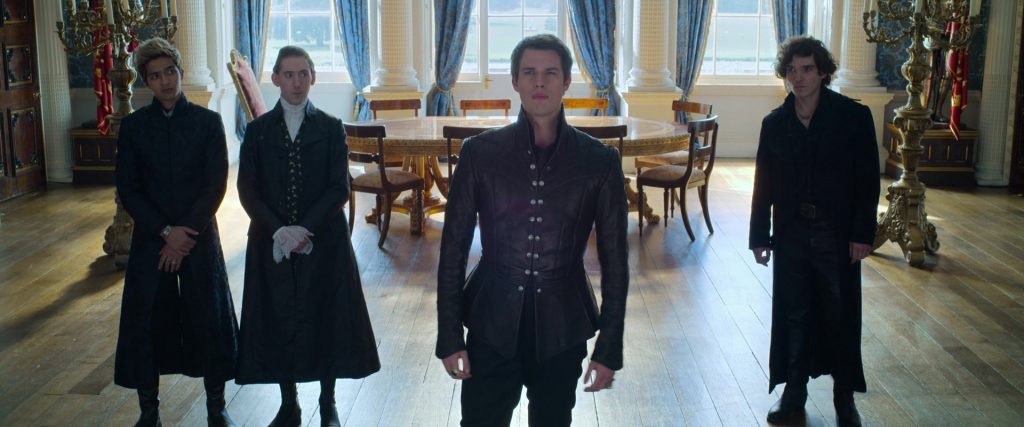
Next, we have Nicholas Galitzine depicting another charming royal, though Cinderella was prior to his turn as Prince Henry in Red, White and Royal Blue. Having seen the latter first, the former confirmed my theory Galitzine was born to play royalty. Both share similarities, though I’d argue Robert is slightly edgier than Henry in a few ways, perhaps most superficially evident through his earring and almost exclusively black wardrobe. Despite facing slightly different challenges, one of their parallels is they recognise the flaws and issues that come with unwaveringly obeying a traditional monarchical structure. However, they’ve been raised to believe they’re powerless to change the status quo despite their position. In that vein, Robert has a turbulent relationship with his father. Strict and prickly King Rowan (Pierce Brosnan) is pressuring him to stop being frivolous and marry advantageously. Nonetheless, Robert has made a sport of dodging engagement offers. At first glance this seems like rebellion and so that he can continue palling around with his loyal merry bros instead of settling down and accepting royal responsibilities. Nevertheless, we discover Robert’s reluctance to wed stems from fear of marrying a stranger he’s unsuited to. Especially since Rowan drills into him that princes and kings marry for power, not love. For all his bravado, Robert has moments of genuine emotional vulnerability not always awarded to male characters. Unfortunately, Rowan’s not easily deterred, giving his son one last chance to find a bride at the kingdom’s upcoming ball, where prospective princesses will be attending. Otherwise Rowan will choose. Robert acquiesces after convincing him to invite all the kingdom’s maidens, regardless of station. Robert thought of this after Ella catches his eye, notably during a love ballad. He becomes enchanted, especially since she boldly talks back to his father. He immediately takes action opening up the ball, then sets out to find the mysterious maiden to invite her. His desire to feel a genuine connection with Ella is so profound he takes the precaution of a disguise so whatever feelings she could have aren’t influenced by his title. Planning to reveal the truth at the ball. In a refreshing change of pace from convention, the male protagonist dreams of love and finding his soulmate.
Much like Ella, this character was granted much-deserved updates. Prince Robert is not only charming, handsome and benevolent, but is also allowed to have flaws, quirks and character development. Which Galitzine is more than capable of bringing to life. Initially Robert exists in his own world, both literally and figuratively. No doubt a consequence being sheltered a lifetime in a literal castle. I wouldn’t call Robert selfish, but he begins more attuned to his own needs and desires, unconsciously oblivious to his privilege. Meeting and falling for Ella is the catalyst to his journey and growth. Such additions make this version of the Prince more relatable, allowing him to stand out from previous portrayals of superficial perfection.

Idina Menzel personifies a different sort of melodic ice-queen when she steps into the stepmother’s shoes. Vivian treats Ella dreadfully and is emotionally abusive, however their relationship is much more complex. For example, as opposed to previous portrayals Vivian actually does have some maternal feelings towards her stepdaughter, and the film concludes hinting at potential reconciliation between the two. A more moving and realistically layered depiction. Menzel is masterful is providing depth to a cynical social-climbing character that’s only ever been portrayed as being cruel and evil for the sake of it and succeeds in making Vivian somewhat sympathetic. Especially when we discover her hard-headed coldness comes from real places of hurt after having her own dreams and ambitions broken by family and the world. While it doesn’t absolve earlier treatment of Ella, it gives audiences a chance to understand her perspective and what made her that way. Vivian had dreams and desires like Ella, before becoming twisted by societal expectations.
As previously mentioned, Robert and Rowan don’t start with the best relationship. The latter an obstinate no-nonsense sovereign (both as ruler and family patriarch) and the former wanting to be nothing like him. Rowan intensely scrutinises and criticises Robert’s every move, constantly pressuring him to be a worthy heir who’ll relentlessly follow tradition no matter what. This pursuit leads to him frequently dismissing his wife and their daughter, Princess Gwen (Tallulah Grieve). An original character who demonstrates interest and capacity for state affairs but isn’t considered an option for heir like Robert is just from her gender. While Rowan puts up a convincing front as merciless patriarch, deep down he does care for his family. But due to toxic masculinity and his status as King not only does he find it inappropriate to express vulnerable feelings, he doesn’t know how. While this isn’t discussed I think that Rowan is merely continuing a cycle that his own father and King would have instilled into him. Possibly through even stricter and crueller means than he implements towards Robert. Like his son, Rowan goes through his own emotional journey and character development across the film.
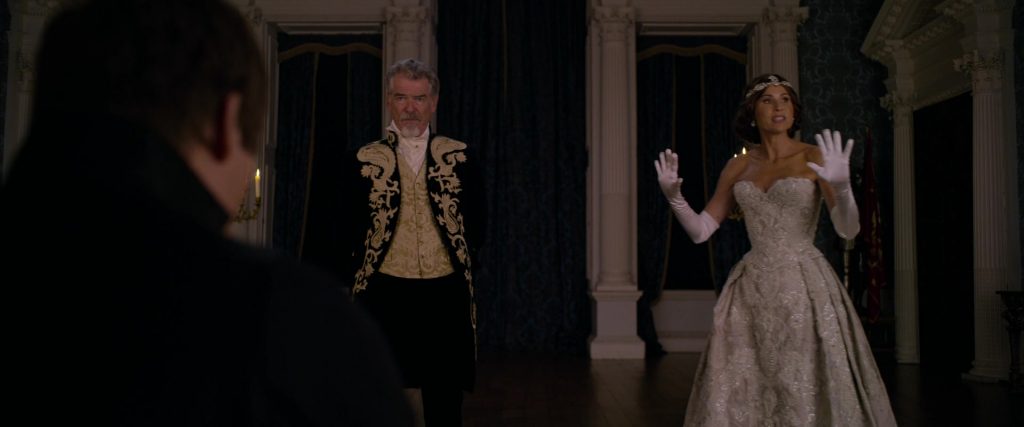
Minnie Driver steps into a well-deserved crown as strong and regal Queen Beatrice. While father and son are strained, it’s repeatedly stated that mother and son are the exact opposite. Beatrice is fiercely protective of Robert and supports his wish to marry for love. Yes, the Queen’s scenes tend to be in relation to her husband, but this is far from a disservice. Beatrice has talents and interests beyond being the Queen, such as painting and fencing. Furthermore, she speaks her mind to Rowan and calls him out often. This leads to a powerful scene when she confronts Rowan about the way he’s been acting not only as King, but his treatment of her and their family. Rowan may be the authority of their Kingdom, but Beatrice refuses to blindly submit to him. The Queen knows her worth and what she, her family and the kingdom deserve. My only complaint about Beatrice is we didn’t get more insight into her relationship with Gwen, especially as two proficient women who are expected to be ornamental at best. However, there is only so much a film can explore in its run time, and as Robert and Rowan explore a paternal relationship, the maternal one is examined with Ella and Vivian.
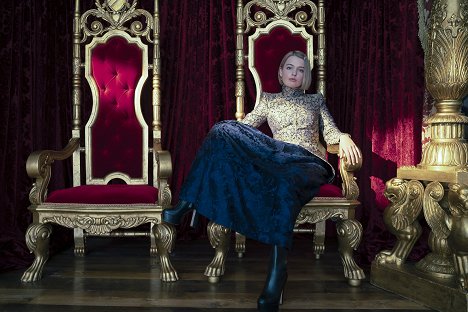
Additionally, I feel that Robert’s younger sister Gwen merited more screen time, and not just to further explore her individual relationships within her family. Gwen’s an interesting original character, who desires being Rowan’s heir as much as Robert does. Though she is debatably better suited and more passionate. The Princess’ tenacity shines every time she speaks her mind and challenges sexism. Her sidelining could have been a clever tongue-in-cheek nod at how most other characters overlook and dismiss her opinions, but once again it’s more likely we didn’t get more Gwen because there’s only much that can be included and explored in 113 minutes. Still, it would have been nice to see even a little bit more of her since as far as we can see Ella, Gwen and Beatrice are the only women actually challenging men and traditional status quo. But I do appreciate that Gwen’s arc has nothing to do with avoiding an unwanted arranged marriage, and I love a scene where Ella (who hadn’t met her yet at this point) states the real brains of the family is Princess Gwen. Despite being stuck on the sidelines Gwen still manages to inspire her people by being the type of character that makes an impact despite limited scenes. We clearly understand what drives and motivates her.
It’s worth noting that despite parallel interest in the throne, Gwen and Robert aren’t presented as enemies or bitter rivals. Which is relieving as it would’ve felt like an obvious route to take. While Robert, like other characters, is guilty of overlooking his sister, he never stoops low to taunt her by rubbing his title and position as heir in her face. Simultaneously, while Gwen constantly questions her father’s pronouncements, she never resorts to take cruel shots at Robert or his own suitability as heir in an attempt of presenting herself as a better option. So, while their sibling relationship unfortunately isn’t explored greatly, I feel like this still says a lot about the type of bond and rapport they have between the scenes. This is further implied in a much clearer manner when Robert gives Gwen a special gift that she unmistakeably appreciates. Additionally, Grieve’s performance in a scene where Rowan is cruelly admonishing Robert and dismissing Beatrice displays Gwen’s distress at how her father treats her family. This is significant since whenever Gwen herself is treated unfairly she remains stoic and poised. This consequently insinuates she’s more hurt by a loved one’s pain than her own, inferring even more about the type of person she is. All in all, Tallulah Grieve’s portrayal shouldn’t be overlooked the same way her character is. I would very happily watch Princess Gwen in a spin-off film or series featuring her at the centre!
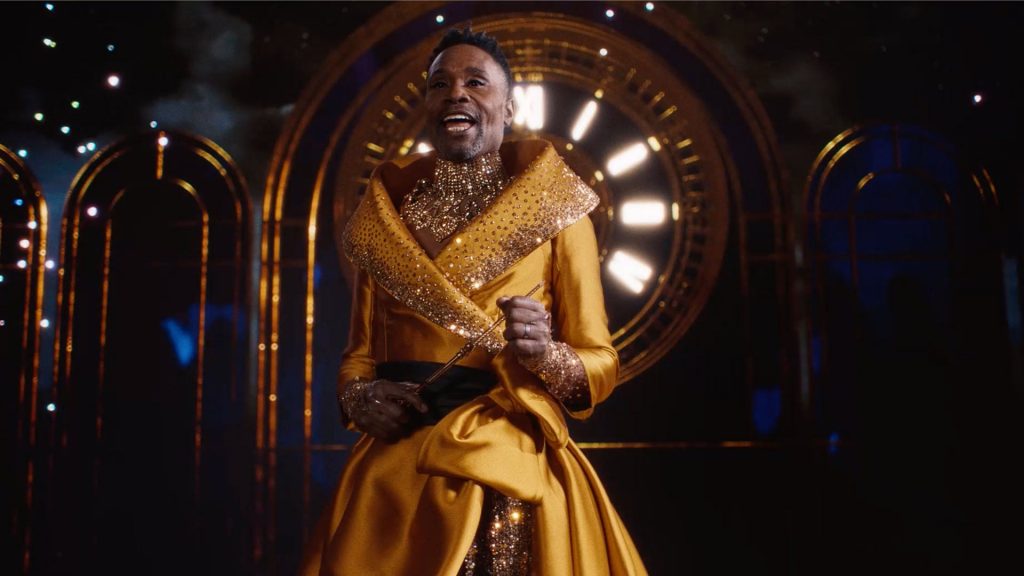
Billy Porter absolutely nails the role of Ella’s magical fairy godparent, who has traditionally been portrayed exclusively by women. Gender flipping a legendary character is always a risk, but as long as the actor and script do them justice (which is the case here) it’s worth it. Much like Ella, Fab G fits into no one’s pre-existing mould and has no intention of ever trying to. Additionally, having a man so effortlessly put his own unapologetic spin on a character audiences traditionally associate with women and overly feminine iconography very blatantly challenges toxic masculinity. While Porter only appears onscreen to be iconic in dishing out magic and advice alike for one scene, he makes every second as Fab G count. He may leave you wanting more, but fortunately we are blessed and treated with Fab G’s witty remarks thanks to Porter’s narration in the film.
Cinderella managed to truly move and astonish me with its emotional beats while still being genuinely entertaining and funny. What’s more as an avid lover of film, great performances and representations are not something that I could ever overlook. In other words, what a great time!
Having said that, I’d recommend more to people who are more partial to Barbie and Mamma Mia than to exclusively hardcore Oppenheimer or The Dark Knight enthusiasts. Moreover, we must be wary of harmful statements that circulate as there has been an unfortunate trend in films that feature more diverse casts and updated takes on stories/genres. They get review-bombed by trolls that don’t want to give them a real chance for being boring and woke (such as Captain Marvel and The Eternals) when they just feature more inclusive representation and storytelling that better embodies the real world and cultural zeitgeist.
